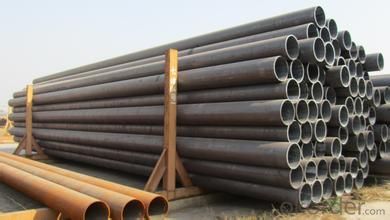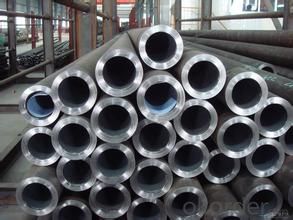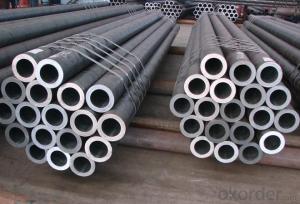Boiler Tubes Steel Pipe High Quality
- Loading Port:
- China Main Port
- Payment Terms:
- TT or LC
- Min Order Qty:
- 25 m.t.
- Supply Capability:
- 8000 m.t./month
OKorder Service Pledge
OKorder Financial Service
You Might Also Like
1、Structure of High Quality Boiler Tubes:
Boiler Tubes is used to produce boilers.
2、Main Features of the High Quality Boiler Tubes:
• High manufacturing accuracy
• High strength
• Small inertia resistance
• Strong heat dissipation ability
• Good visual effect
• Reasonable price
3、High Quality Boiler Tubes Specification:
Standard | GB, DIN, ASTM ASTM A106-2006, ASTM A53-2007 |
Grade | 10#-45#, 16Mn 10#, 20#, 45#, 16Mn |
Thickness | 8 - 33 mm |
Section Shape | Round |
Outer Diameter | 133 - 219 mm |
Place of Origin | Shandong, China (Mainland) |
Secondary Or Not | Non-secondary |
Application | Hydraulic Pipe |
Technique | Cold Drawn |
Certification | API |
Surface Treatment | factory state or painted black |
Special Pipe | API Pipe |
Alloy Or Not | Non-alloy |
Length | 5-12M |
Outer Diameter | 21.3-610mm |
Grade | 20#, 45#, Q345, API J55, API K55, API L80, API N80, API P110, A53B |
Standard | ASME, ASTM |
1) Material:20#(ASTM A 106/A53 GRB.API5LGRB,GB),45#,16Mn,10#.
2) Specification range:OD:21.3-610mm,WT:6-70mm,length:6-12m or according to the requirement of clients.
3) Excutive standards:GB,ASME API5L.ASTM A 106/A53,Despite of the above standards,we can also supply seamless steel pipe with standard of DIN,JIS,and so on,and also develop new products according to the requirements of our clients!
4) Surface:black lacquered,varnish coating or galvanized.
5) Ends:Beveled or square cut,plastic capped,painted.
6) Packing:bundles wrapped with strong steel strip,seaworthy packing.
4、Packaging & Delivery
Packaging Details: | seaworthy package,bundles wrapped with strong steel strip |
Delivery Detail: | 15-30days after received 30%TT |
5、FAQ of High Quality Boiler Tubes:
①How is the quality of your products?
Our products are manufactured strictly according to national and internaional standard, and we take a test
on every pipe before delivered out. If you want see our quality certifications and all kinds of testing report, please just ask us for it.
Guaranteed: If products’ quality don’t accord to discription as we give or the promise before you place order, we promise 100% refund.
②How about price?
Yes, we are factory and be able to give you lowest price below market one, and we have a policy that “ for saving time and absolutely honest business attitude, we quote as lowest as possible for any customer, and discount can be given according to quantity”,if you like bargain and factory price is not low enough as you think, just don’t waste your time.Please trust the quotation we would give you, it is professional one.
③Why should you chose us?
Chose happens because of quality, then price, We can give you both.Additionally, we can also offer professional products inquiry, products knowledge train(for agents), smooth goods delivery, exellent customer solution proposals.Our service formula: good quality+good price+good service=customer’s trust
SGS test is available, customer inspection before shipping is welcome, third party inspection is no problem.
6、High Quality Boiler Tubes Images:


- Q:Can steel pipes be used for hydropower systems?
- Yes, steel pipes can be used for hydropower systems. Steel pipes are commonly used in hydropower systems for various applications such as penstocks, which are used to transport water from a reservoir to a turbine. Steel pipes are preferred for their strength, durability, and ability to withstand high pressure and water flow. They are also resistant to corrosion, making them suitable for long-term use in hydropower systems. Additionally, steel pipes can be easily welded or joined, allowing for flexibility in system design and installation. Overall, steel pipes are a reliable and widely used choice for hydropower systems.
- Q:What are the different grades of steel used for pipes?
- Pipes are manufactured using various grades of steel, each possessing unique properties and applications. Some commonly utilized grades include: 1. Carbon Steel: This type of steel is widely employed in pipe manufacturing, particularly for low-pressure purposes. It contains a low carbon content, typically less than 0.30%, facilitating easy welding and forming. Carbon steel pipes are known for their durability and cost-effectiveness, making them suitable for diverse industries. 2. Stainless Steel: Stainless steel pipes are renowned for their corrosion resistance and high strength. They consist of an alloy of iron and chromium, with additional elements like nickel and molybdenum enhancing their properties. These pipes find extensive usage in industries such as chemical processing, food production, and oil and gas, where corrosion resistance is vital. 3. Alloy Steel: Alloy steel pipes are created by incorporating elements like manganese, chromium, or nickel into carbon steel. This enhances their strength, hardness, and wear resistance, rendering them appropriate for high-pressure and high-temperature applications. Industries such as power generation, petrochemical, and aerospace frequently employ alloy steel pipes. 4. Duplex Steel: Duplex steel represents a type of stainless steel that combines austenite and ferrite phases. This results in a material possessing exceptional strength, corrosion resistance, and toughness. Duplex steel pipes are commonly utilized in offshore oil and gas platforms, as well as in chemical and petrochemical industries. 5. Low-Temperature Steel: Low-temperature steel is specifically designed to withstand extremely cold temperatures without becoming brittle. These pipes find significant use in industries such as cryogenic storage, LNG transportation, and refrigeration. Choosing the appropriate grade of steel is crucial to ensure optimal pipe performance and longevity. Factors such as temperature, pressure, corrosion resistance, and cost should be taken into account when selecting the steel grade for pipes.
- Q:What kinds of steel pipe are divided into?
- The steel pipe seamless steel pipe and welded steel pipe (tube) two categories. According to the section shape and can be divided into round tube shaped tube, round steel pipe is widely used, but there are also some square, rectangular, semicircular, hexagonal, triangular, octagonal shaped steel tube.Seamless steel pipe: seamless steel pipe is ingot or solid billet made by capillary hole, then hot, cold or cold drawing. Made of seamless steel pipe specifications with outer diameter * wall thickness mm. Number of seamless steel pipe cold and hot points of seamless steel pipe (DIAL) two categories.
- Q:What are the different types of steel pipes available?
- There are several types of steel pipes available, including seamless pipes, welded pipes, galvanized pipes, and stainless steel pipes.
- Q:What is the difference between steel pipe and copper pipe?
- The main difference between steel pipe and copper pipe lies in their composition and properties. Steel pipe is typically made from carbon steel, which is an alloy of iron and carbon. On the other hand, copper pipe is made from copper, a naturally occurring metal. One key difference is their durability. Steel pipe is known for its strength and resilience, making it suitable for high-pressure applications and harsh environments. It is highly resistant to corrosion, making it a long-lasting option. Copper pipe, on the other hand, is known for its malleability and ease of installation. It is less durable than steel and can corrode over time, especially when exposed to certain chemicals or aggressive water conditions. Another difference is their thermal conductivity. Copper pipe is an excellent conductor of heat, making it ideal for applications that require efficient heat transfer, such as in plumbing systems for hot water supply. Steel pipe, however, has a lower thermal conductivity compared to copper, which may affect its performance in certain applications. Cost is another factor to consider. Copper pipe is generally more expensive than steel pipe due to the higher cost of copper as a raw material. Additionally, copper pipe requires specialized tools and techniques for installation, which can add to the overall cost. Steel pipe, on the other hand, is often more cost-effective and easier to work with, making it a popular choice for a wide range of applications. In summary, the main differences between steel pipe and copper pipe are their composition, durability, thermal conductivity, and cost. Each type has its own advantages and disadvantages, and the choice between them depends on the specific requirements of the application at hand.
- Q:Can steel pipes be used for underground chemical pipelines?
- Indeed, underground chemical pipelines can utilize steel pipes. The chemical industry, among other industries, extensively employs steel pipes owing to their robustness, potency, and resistance to corrosion. To ensure suitability for underground chemical pipelines, it is crucial to select an appropriate steel grade that can withstand corrosion from the specific chemicals being transported. Furthermore, the resistance of steel pipes to chemical corrosion can be further augmented through the implementation of suitable coating and lining techniques. Regular inspection and maintenance are imperative to guarantee the integrity and safety of the underground chemical pipeline system.
- Q:Are steel pipes environmentally friendly?
- Steel pipes can be considered environmentally friendly due to their high durability and recyclability. Steel is a sustainable material that can be reused multiple times without losing its structural integrity. Additionally, steel pipes have low emission rates during production and can be coated to prevent corrosion, extending their lifespan. However, the environmental impact of steel pipes also depends on factors such as extraction of raw materials and energy consumption during manufacturing.
- Q:Can steel pipes be coated for additional protection?
- Yes, steel pipes can be coated with various materials to provide additional protection against corrosion, abrasion, and other environmental factors. Coatings such as epoxy, polyethylene, and zinc can be applied to enhance the durability and lifespan of steel pipes, making them suitable for diverse applications in different industries.
- Q:How can galvanized steel tubes be painted on the surface?
- Suitable for galvanized base material (antirust primer), epoxy zinc yellow primer (double component), epoxy ester zinc yellow primer.Pretreatment of galvanized sheet when brushing:1, conditional, you can zinc plating phosphating treatment, or first spray a layer of phosphating primer.2, or smooth zinc plating surface sweeping treatment.3, the galvanized workpiece, galvanized pipe surface with solvent (that is, epoxy zinc yellow primer, thinner) wipe, in order to remove the workpiece crude oil protective layer, and increase cleanliness.4, two-component epoxy zinc yellow primer: in strict accordance with the proportion of paint and curing agent paint, and aging 30 minutes later, modulation suitable construction viscosity, you can spray.One component epoxy ester primer: zinc yellow construction viscosity suitable to construction of modulation, the correct construction method.
- Q:Can steel pipes be used for power plant construction?
- Yes, steel pipes can be used for power plant construction. Steel pipes are commonly employed in power plants for various applications such as the transportation of fluids, steam, and gases, as well as for structural support. They offer high strength, durability, and resistance to extreme temperatures and pressures, making them suitable for the demanding conditions found in power plants.
1. Manufacturer Overview |
|
|---|---|
| Location | |
| Year Established | |
| Annual Output Value | |
| Main Markets | |
| Company Certifications | |
2. Manufacturer Certificates |
|
|---|---|
| a) Certification Name | |
| Range | |
| Reference | |
| Validity Period | |
3. Manufacturer Capability |
|
|---|---|
| a)Trade Capacity | |
| Nearest Port | |
| Export Percentage | |
| No.of Employees in Trade Department | |
| Language Spoken: | |
| b)Factory Information | |
| Factory Size: | |
| No. of Production Lines | |
| Contract Manufacturing | |
| Product Price Range | |
Send your message to us
Boiler Tubes Steel Pipe High Quality
- Loading Port:
- China Main Port
- Payment Terms:
- TT or LC
- Min Order Qty:
- 25 m.t.
- Supply Capability:
- 8000 m.t./month
OKorder Service Pledge
OKorder Financial Service
Similar products
New products
Hot products
Related keywords




























